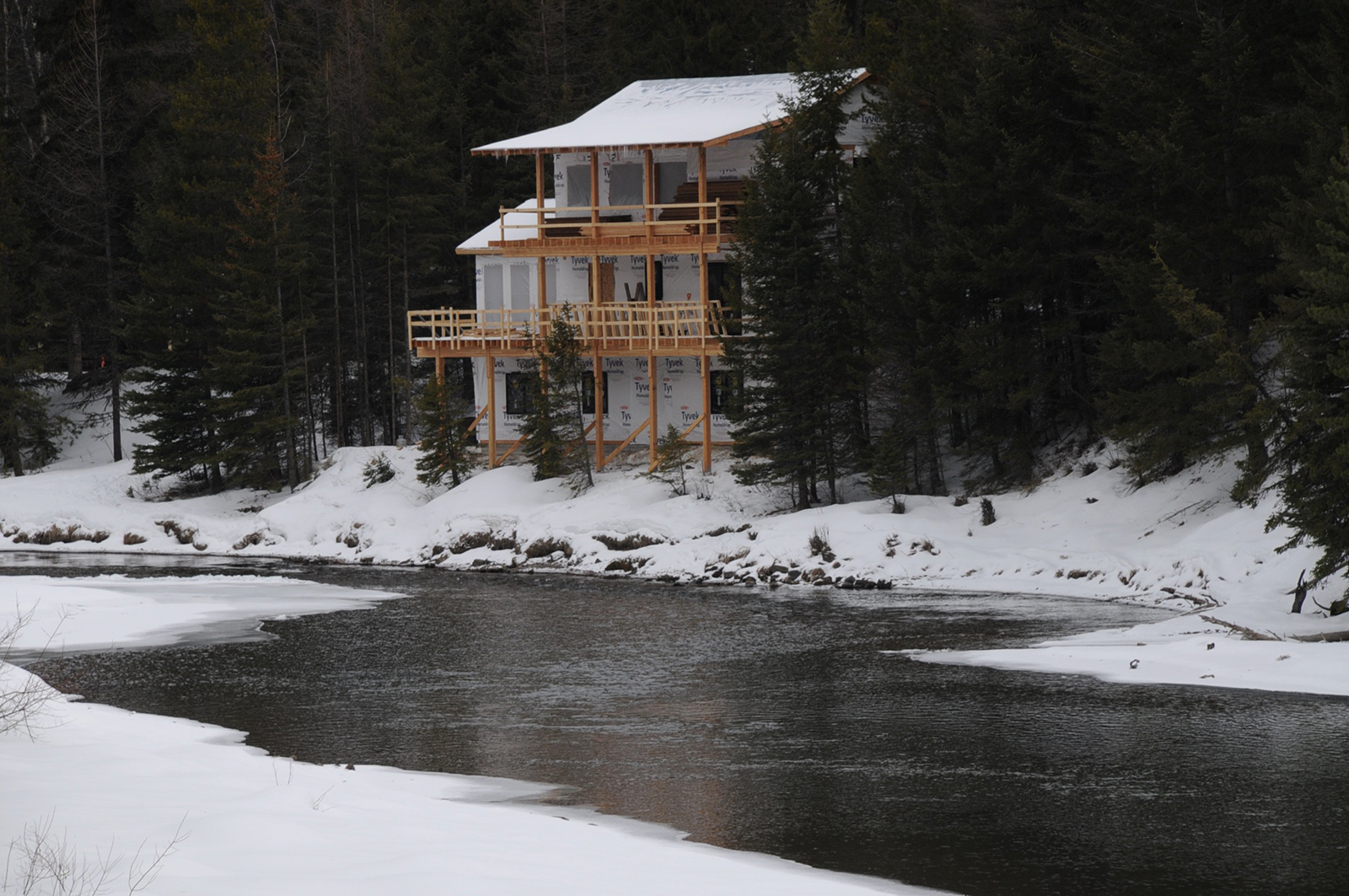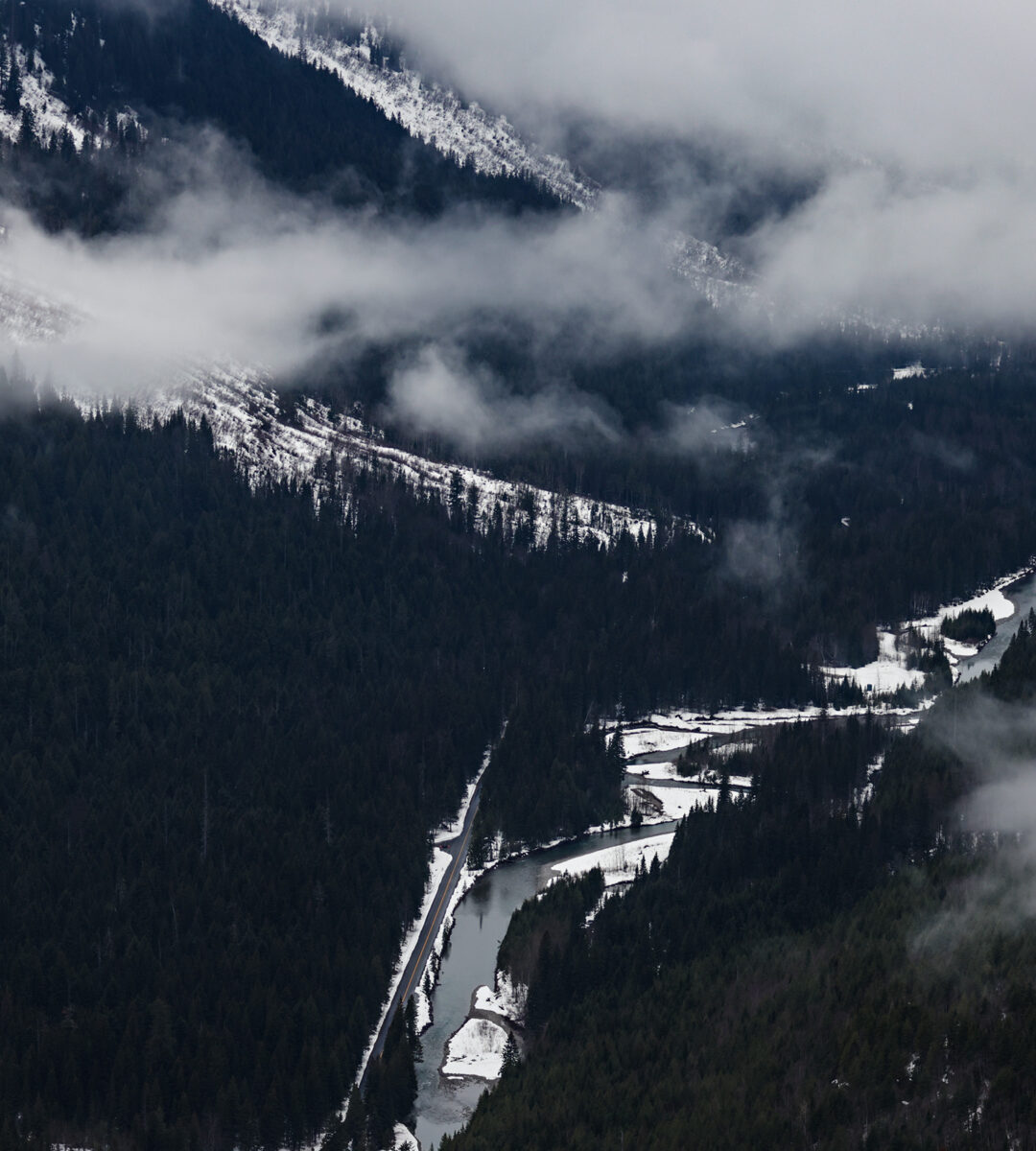McDonald Creek Homeowners Seek Federal Relief in Conservation District’s Demolition Decision
The property owners, who are also suing a local conservation district in Flathead District Court, argue Glacier Park has exclusive jurisdiction over their private parcel inside park boundaries
By Tristan Scott
Having already filed suit locally, a California couple has now turned to a federal judge in Missoula to determine whether a state agency overstepped its authority by ordering the removal of a partially completed home on a private parcel along the banks of Glacier National Park’s McDonald Creek, at a prominent location near Apgar Village inside park boundaries.
John and Stacy Ambler filed the petition for declaratory relief on Dec. 13 in U.S. District Court in Missoula, where they have asked Judge Kathleen DeSoto to weigh in on whether the Flathead Conservation District (FCD) — the political subsidiary of the Montana Department of Natural Resources and Conservation (DNRC) — “has jurisdiction and authority to order the Amblers to dismantle a house they are constructing on real property they own within Glacier National Park.”
Also on Dec. 13, the couple filed an amended complaint in Flathead County District Court before Judge Robert Allison, who wields judicial authority over the county in which the Amblers’ project is located.
The couple submitted both complaints exactly one month after an arbiter in the case affirmed the home was built without approval and remanded the case back to FCD’s Board of Supervisors, which in a unanimous vote ruled that the Amblers must remove the home and remediate the streambed no later than April 1, 2024.
Attorney Trent Baker of Datsopoulos, MacDonald & Lind, a Missoula-based law firm representing the Amblers, said last month that his clients intended to further litigate the matter by appealing the hearing officer’s decision and seeking a judicial ruling in state court. If they are dissatisfied with that lower court’s determination, they may then seek judicial review through an appeal to the Montana Supreme Court.
The litigants will have the same opportunity to appeal future rulings in their federal case, in which Baker and co-counsel J.R. Casillas are named as the principal attorneys.
Together, the dual lawsuits seek to untangle a jurisdictional snarl complicated by the fact that the Amblers built their home on the banks of a perennially flowing stream without a permit to do so, which is a violation of Montana’s Natural Streambed and Land Preservation Act (NSLPA) that governs private actions on public waterways. According to the Amblers, neither Flathead County nor Glacier National Park — the two entities they argue should have the final say in the matter — required any permits to begin construction on the property and connect the residence to the Apgar Village water and sewer system.

Following complaints from residents, however, the Flathead Conservation District conducted an onsite inspection in February and determined the Amblers violated the NSLPA by building on an immediate bank of McDonald Creek and excavating the streambank to create a pad for construction, all without obtaining the necessary 310 permit to do so.
The couple challenged the conservation district’s jurisdictional authority in the case and proceeded to what’s called a declaratory ruling process, which was overseen by hearing officer Laurie Zeller, a retired DNRC bureau chief whose is an expert in streambed permitting. Although Zeller conceded that the Amblers made “a pretty compelling case,” she said her final determination is that the streambed law applies to the Amblers and the Flathead Conservation District exercised proper enforcement authority when it ordered the structure be removed.
“I believe that everyone who is building on or near a perennial-flowing stream in the state of Montana is subject to that law,” Zeller said last month. “I believe that the house is within the definition of a perennial-flowing stream, I believe it has a permanent impact and I think as such it requires review.”
The case is unique given the project’s location inside Glacier National Park, which when established in 1910 trapped private tracts of land staked by homesteaders prior to the park’s existence. Originally totaling 13,000 acres, many of the homesteaders sold their property to the National Park Service a century ago, but some remain. Known as “inholding,” the bill establishing Glacier Park was explicit in its concession that landowners would retain “full use and enjoyment of their properties” and that “nothing herein contained shall affect any valid existing claim, location or entry under the land rules of the United States, or the rights of any such claimant.”

In 2019, the Amblers purchased the property in Glacier Park, and later began constructing a house on the property.
“Glacier National Park allowed the construction and allowed the Amblers to connect to the Apgar Village water and sewer system,” the federal complaint states. “The Amblers dispute that the FCD has jurisdiction over the property and dispute that the NSLPA applies to the property.”
According to Zeller, the DNRC hearing officer, the Amblers’ assertion that the property was subject to federal and not state jurisdiction was incorrect by her analysis.
“This particular project involves a private individual on private land pursuing a private project, so there’s no federal nexus to this particular project,” Zeller said. “In fact, some of the information in the record shows that the federal government was not taking jurisdiction.”
A federal court clerk issued a summons to FCD on Dec. 13. The agency must respond within 21 days of service.
Judge DeSoto scheduled a pretrial conference in the matter for March 19, 2024.